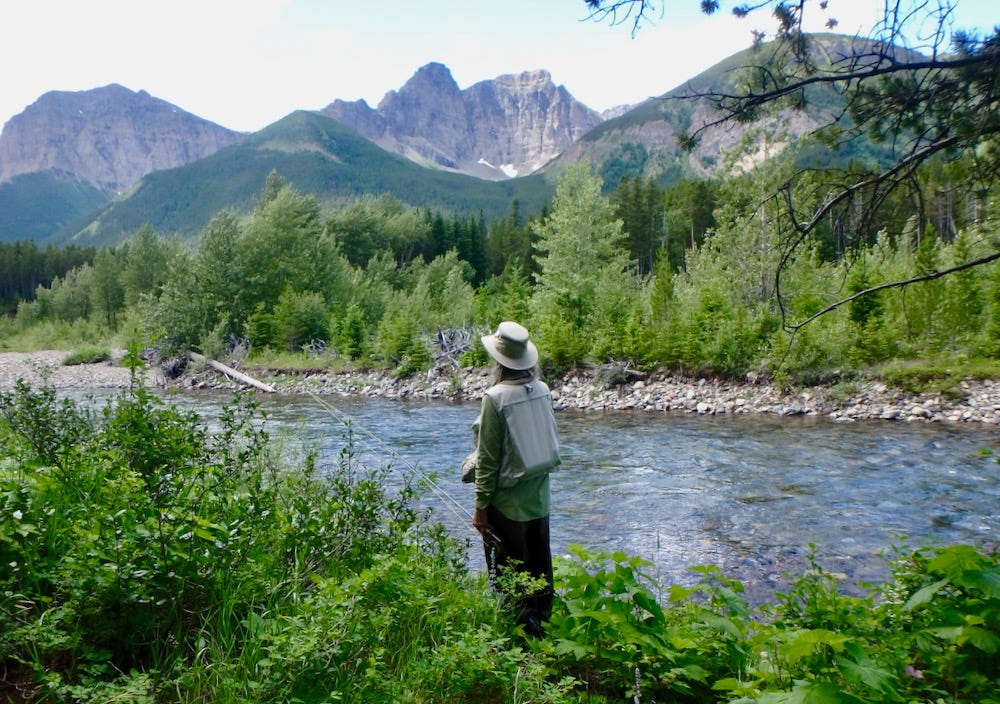The Importance of Looking Back
Lorne Fitch provides an insightful look at "the past" with a focus on its significant value and why it shouldn't simply be dismissed.
The Value of Nostalgia
Lorne Fitch, P. Biol.
There are those who scoff at memories of the past, of stories of clean water, abundant wildlife, space and quiet. Nostalgia, they say, is just cheap emotion tarted up to fool us into believing the past has some value. Forget the past. You have to accept that the past is over. No matter how many times you revisit it, analyze it, regret it or sweat over it—it’s over, done with. There’s nothing of value left there. But there is!
It would be useful to remind ourselves what nostalgia means. In the Greek roots of the word is meaning, literally, the return to home. Home, as in where we have come from, a place that had possibilities, and still might if we quit treating memories of that condition with scorn. Forgetting the past has real implications, as we are cautioned, in being condemned to repeat past mistakes.
I rebel at the contention I am a wistful romantic because I believe in reminding people of where we came from, of what the past resembled and of the opportunity to recapture some of what our home represented before it disappears. Like Charles Darwin who observed, “It is impossible to reflect on the changed state of the American continent without the deepest astonishment. Formerly it must have swarmed with great monsters.”
For me, examining the past is an adventure. It’s a trip into a mostly forgotten arena of places, things and conditions almost inconceivable in today’s world. For those who would avoid it, it has all the glamour of ripping a Band-Aid off an open wound.
The real romantics are those who firmly believe that our history is a triumphal march of progress, that change is indiscriminately for the better. Our history of development is substantially more nuanced than that glib pronouncement. We have made progress, measured in terms of technological achievements. But it is unclear if similar progress has been made in ethics, measured in how we treat watersheds, biodiversity and the other elements that gave us wealth, comfort and security. Technological advancements have created the illusionary freedom from our home and not the knowledge of its contribution.
Aldo Leopold touched on this with, “Perhaps the most serious obstacle impeding the evolution of a land ethic is the fact that our educational and economic system is headed away from rather than toward, an intense consciousness of land.” He might have observed that progress might only be made with a view backwards, at where we came from, what we had available to us and then, what is left.
Leopold described a land ethic in ecological terms as “a limitation on freedom of action in the struggle for existence.” Yet, there is no universal, acknowledged ethic “dealing with man’s relation to land and to the animals and plants which grow upon it.” Part of this void relates to a disconnect between us and the land, itself a function of an inability to recognize where we have come from. The other failure is in our sense we need apply no limits on resource use. Lastly, it is the discounting of nostalgia, the memory of the past, as myth.
Those who would reinterpret the past seem to forget that we also construct the present as a myth. Believing the present still represents an unlimited set of development possibilities is a potent and dangerous myth. If you diminish the past it’s a way of making our actions in the present more rational. The future then has to take care of itself, unhinged from both the present and the past.
A critic might say a ship does not sail with yesterday's wind, but in reality the course into today is determined by the past. Ignoring the past can’t save us from its consequences, any more so than throwing away the empty box of chocolates is a viable weight loss technique.
Whether it’s the memory of native trout in a stream now barely a tepid trickle, caribou once found up and down the extent of the Eastern Slopes or the reminiscence of a harmonic throbbing of dozens of sage grouse males on a grassland lek site, nostalgia can serve as a guide, maybe a conscience. Without it we lack perspective, a spatial and temporal context. Time doesn’t need to set a seal on memory. We don’t have to be marooned on the island of today.
“There is nothing in its wide universe so vast as our own ignorance,” relates Paul Gruchow, an American essayist. Nostalgia isn’t a melancholy escape into the past, nor is it a sentimental narrative. It’s a series of guideposts to the future. Knowing that is our one real hope.
Lorne Fitch is a Professional Biologist, a retired Fish and Wildlife Biologist and a past Adjunct Professor with the University of Calgary. He is the author of Streams of Consequence: Dispatches From the Conservation World and Travels Up the Creek: A Biologist’s Search for a Paddle.


Very good, this was touched on in the book Collapse, by the time the final trees were cut down in the Easter Islands.. the memories of these long ago forested islands was gone.
There is no longer an unbelievable walleye fishery at the mouth of the Moon River on Georgian Bay where I spent my summers. And that makes me sad. And then mad.
Ross Hodgetts